Shradh Ceremony by Expert Pandits | Pandit For Shradh
₹4,000.00 ₹6,700.00Price range: ₹4,000.00 through ₹6,700.00
Book Authentic Shradh Ceremony by Expert Pandits – Honor Your Ancestors with Vedic Rituals
Perform the Shradh Ceremony with certified Vedic Pandits from PanditJiOnWay.com and seek peace for your departed ancestors. Our Shradh Puja services are conducted as per the Hindu calendar Tithi, following all Vedic scriptures and traditions. From Pind Daan, Tarpan, to Brahman Bhojan, we ensure a complete and spiritually uplifting experience. Available for home visits, temple setups, or online Shradh Puja with full puja samagri included.
- Removes Pitra Dosh
- Receives ancestral blessings
- Available PAN India
Book now for a peaceful and blessed Shradh ceremony.
Description
Shradh Ceremony – Honor Ancestors with Devotion and Peace
Shradh is a sacred Hindu ritual performed to pay homage to one’s forefathers, also known as Pitrus. Deeply rooted in Vedic traditions, this ceremony is conducted on the same Tithi (lunar day) when the soul of the deceased left their earthly body. Performing Shradh ensures peace for the departed soul and invokes their blessings upon the family. At PanditJiOnWay.com, we provide authentic and Vedic-based Shradh Ceremony services by certified and experienced Pandits who conduct the rituals with utmost devotion, compassion, and adherence to scriptures.
Importance of Shradh Ceremony
In Hinduism, it is believed that ancestors reside in Pitrulok, a spiritual realm governed by Lord Yama. The Shradh ceremony bridges the connection between the living and the deceased, ensuring the departed souls attain peace and moksha (liberation). According to the Garuda Purana and Manusmriti, failing to perform Shradh can lead to Pitra Dosh, a spiritual imbalance that causes obstacles in one’s life, such as delay in marriage, financial problems, and health issues.
Performing Shradh with faith and dedication:
- Liberates the souls of the deceased from earthly attachments
- Reduces the impact of Pitra Dosh
- Invokes ancestral blessings
- Purifies the karma of the family lineage
Shradh Ceremony Procedure
The Shradh ritual is performed in a sacred manner with Vedic chants and precise rituals, as outlined in ancient scriptures like Yajurveda and Taittiriya Samhita. The process includes:
1. Vishwadev Sthapana
The ceremony begins with invoking the universal deities, Vishwadeva, to sanctify the space and invite divine energies for the smooth conduct of the ritual.
2. Pinda Pradan (Offering Pindas)
Pindas are sacred rice balls offered to ancestors. Made using rice, ghee, curd, honey, sugar, and black sesame seeds, they are believed to nourish the soul in the afterlife and help them attain liberation.
Pind Daan is ideally performed with calmness and a devoted heart.
3. Tarpan (Water Offering)
Water mixed with black sesame seeds and barley is offered to ancestors while chanting mantras. It is an act of gratitude, requesting peace and forgiveness from the departed souls.
4. Brahman Bhojan (Feeding Brahmins)
Feeding Brahmins is considered equivalent to feeding the ancestors. A meal comprising Satvik food is served to the Brahmins as a final act of Shradh, symbolizing selfless giving.
We at PanditJiOnWay.com can organize Brahmin Bhojan with high-quality ingredients, either at your location or ours.
Duration of Shradh Ceremony
The complete Shradh ceremony usually lasts between 45 minutes to 1.5 hours, depending on the type of Shradh, number of Brahmins, and regional or family traditions.
Types of Shradh Performed
We provide multiple types of Shradh services to cater to different family customs and spiritual needs:
- Ekodishta Shradh – Performed for an individual ancestor
- Hiranya Shradh – Conducted without Havan, ideal for households with space limitations
- Shradh with Havan – Includes fire rituals for added spiritual benefit
- Mahalaya Shradh – Conducted during Pitru Paksha, the most auspicious time to perform ancestral rituals
Each Shradh type is customized according to your Gotra, Tithi, and other traditional practices.
Benefits of Performing Shradh
Performing Shradh annually is not just a tradition but a spiritual necessity for many Hindu families. The benefits include:
- Ancestors’ Blessings: Brings health, prosperity, and emotional harmony
- Pitra Dosh Removal: Balances karmic debt and mitigates family problems
- Spiritual Purification: Promotes spiritual progress of both the departed soul and the performer
- Karmic Harmony: Aligns one’s karma with the universal cycle, ensuring success in personal and professional life
Why Choose PanditJiOnWay for Shradh Ceremony?
We ensure that every aspect of the Shradh Ceremony is performed with precision and reverence.
Experienced Pandits
All our Pandits are well-trained in Vedic Pathshalas and have years of expertise in conducting Shradh ceremonies as per regional customs.
Puja Samagri Provided
From Pindas to Havan Samagri, we bring everything needed for the ceremony so that you can focus on devotion.
In-House or On-Site Options
Whether you prefer to conduct the ritual at your home or at our clean and serene location, we offer complete flexibility.
Personalized Services
We tailor each ceremony based on your language preference, Gotra, Veda Shakha, and spiritual goals.
Ideal Time for Shradh Ceremony
According to scriptures and priestly recommendations, the most suitable time to perform Shradh is between 11:00 AM to 3:00 PM. The energy of the day is most aligned with ancestral connections during this window.
Special Services During Pitru Paksha
Pitru Paksha is a sacred 16-day period in the Hindu lunar calendar dedicated entirely to ancestors. We offer specialized Shradh services during this time, with options for Gaya Shradh, Haridwar Shradh, and Prayagraj Shradh.
You can read more about Pitru Paksha and its significance in this detailed article by The Times of India
Frequently Asked Questions (FAQs) About Shradh Ceremony
Q1. What is the Shradh Ceremony in Hinduism and why is it important?
A: Shradh is a sacred Vedic ritual in Hinduism performed to honor and offer prayers to one’s deceased ancestors (Pitrus). It is believed to bring peace to the departed soul and invoke their blessings for health, wealth, and prosperity. Performing Shradh annually helps eliminate Pitra Dosh and maintain spiritual harmony in the family.
Q2. When should Shradh Puja be performed?
A: Shradh Puja should be performed on the Tithi (lunar day) of the ancestor’s death according to the Hindu calendar. If the exact date is unknown, it is recommended to perform it during Pitru Paksha, especially on Mahalaya Amavasya—the most auspicious day for ancestral offerings.
Q3. Can I perform Shradh at home or should it be done at a temple or holy place?
A: Shradh can be performed at home, in a temple, or at sacred places like Gaya, Haridwar, or Prayagraj. At PanditJiOnWay.com, we offer both home-based and in-house Shradh Puja services with complete Puja Samagri and experienced Pandits.
Q4. What is Pind Daan and why is it performed during Shradh?
A: Pind Daan is the offering of rice balls (Pindas) made with ghee, honey, curd, and sesame to the ancestors during the Shradh ceremony. It symbolizes nourishment for the souls and helps them attain peace and moksha. Performing Pind Daan with sincerity is crucial for the success of the Shradh ritual.
Q5. What is Tarpan and how is it done in Shradh rituals?
A: Tarpan is the act of offering water mixed with black sesame seeds (Til) to ancestors while chanting mantras. It expresses gratitude, seeks forgiveness, and requests blessings. Tarpan is a vital component of Shradh and should be performed under the guidance of a learned Pandit.
Q6. How does Shradh help in removing Pitra Dosh?
A: According to astrological texts, Pitra Dosh occurs when ancestors are displeased due to unfulfilled rituals. Performing Shradh with devotion helps nullify Pitra Dosh, resulting in resolution of obstacles like marriage delays, career stagnation, and financial losses. Regular Shradh ensures the flow of positive ancestral energy into the family.
Q7. What are the different types of Shradh ceremonies available?
A: We offer various types of Shradh services including:
- Ekodishta Shradh – for one specific ancestor
- Hiranya Shradh – without Havan, usually simpler
- Shradh with Havan – includes fire rituals for extra spiritual merit
- Mahalaya Shradh – performed during Pitru Paksha
Choose the one based on your family tradition and spiritual requirement.
Q8. Is it mandatory to feed Brahmins (Brahman Bhojan) during Shradh?
A: Yes, feeding Brahmins is an essential part of the Shradh ceremony. It is believed that serving food to Brahmins is equivalent to feeding the ancestors themselves. We ensure quality Satvik Brahmin Bhojan as part of our Shradh Puja packages.
Q9. Can Shradh be done online or virtually?
A: Yes, you can perform online Shradh Puja with guidance from our experienced Pandits. We provide video call services, deliver Puja Samagri to your home, and ensure rituals are followed precisely even in virtual settings.
Q10. What should I do if I missed the annual Shradh Tithi?
A: If you missed the Shradh Tithi, it can still be performed on Mahalaya Amavasya during Pitru Paksha. This day is universally accepted for performing rituals for all departed ancestors and is highly beneficial spiritually.
Q11. How do I book a Pandit for Shradh Puja near me?
A: Simply visit www.panditjionway.com and book a certified Vedic Pandit for your Shradh Ceremony. You can also call our helpline for customized bookings based on Tithi, Gotra, and language preferences.
Q12. What are the benefits of doing Shradh as per Vedic tradition?
A: Performing Shradh as per Vedic rituals brings numerous benefits:
- Peace to departed souls
- Elimination of Pitra Dosh
- Ancestral blessings for health and prosperity
- Removal of obstacles in personal and professional life
- Strengthening of spiritual connection with family lineage
Q13. Are there any food or lifestyle restrictions on Shradh day?
A: Yes, those performing Shradh should follow a Satvik lifestyle on the day—avoiding meat, alcohol, garlic, onions, and negative speech. It’s advised to bathe early, maintain purity, and focus on prayers.
Q14. What is the best time of the day to perform Shradh rituals?
A: The ideal time to perform Shradh is between 11:00 AM and 3:00 PM, as this period (known as Kutup Muhurat) is spiritually aligned for ancestral rituals according to Vedic astrology.
Book Your Shradh Ceremony Now
Performing Shradh is a sacred duty that connects you to your roots and invites peace, abundance, and spiritual well-being. At PanditJiOnWay.com, we make the process seamless and devotional.
- Vedic Certified Pandits
- Complete Ritual Arrangements
- On-Time Services
- Transparent Pricing
- Personalized Puja Setup
Book today at www.panditjionway.com or call us for consultation. Let us help you carry out this sacred ritual with purity, devotion, and satisfaction.
For additional spiritual information, you may also explore Speaking Tree by Times Group – a trusted source for Hindu rituals and spiritual knowledge
Let your ancestors bless you with peace, prosperity, and divine grace. Perform Shradh the Vedic way with PanditJiOnWay.
Additional information
| Package | Economy : (1 Panditji and Puja Samagries), Standard : (1 Panditji and 2 Brahmans for Bhojan) |
|---|
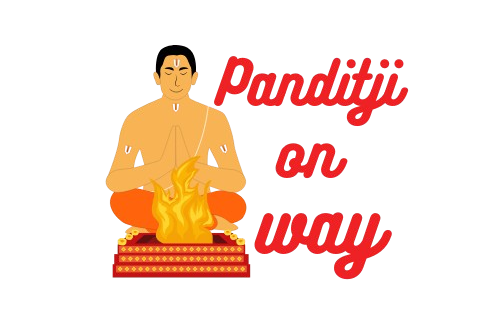
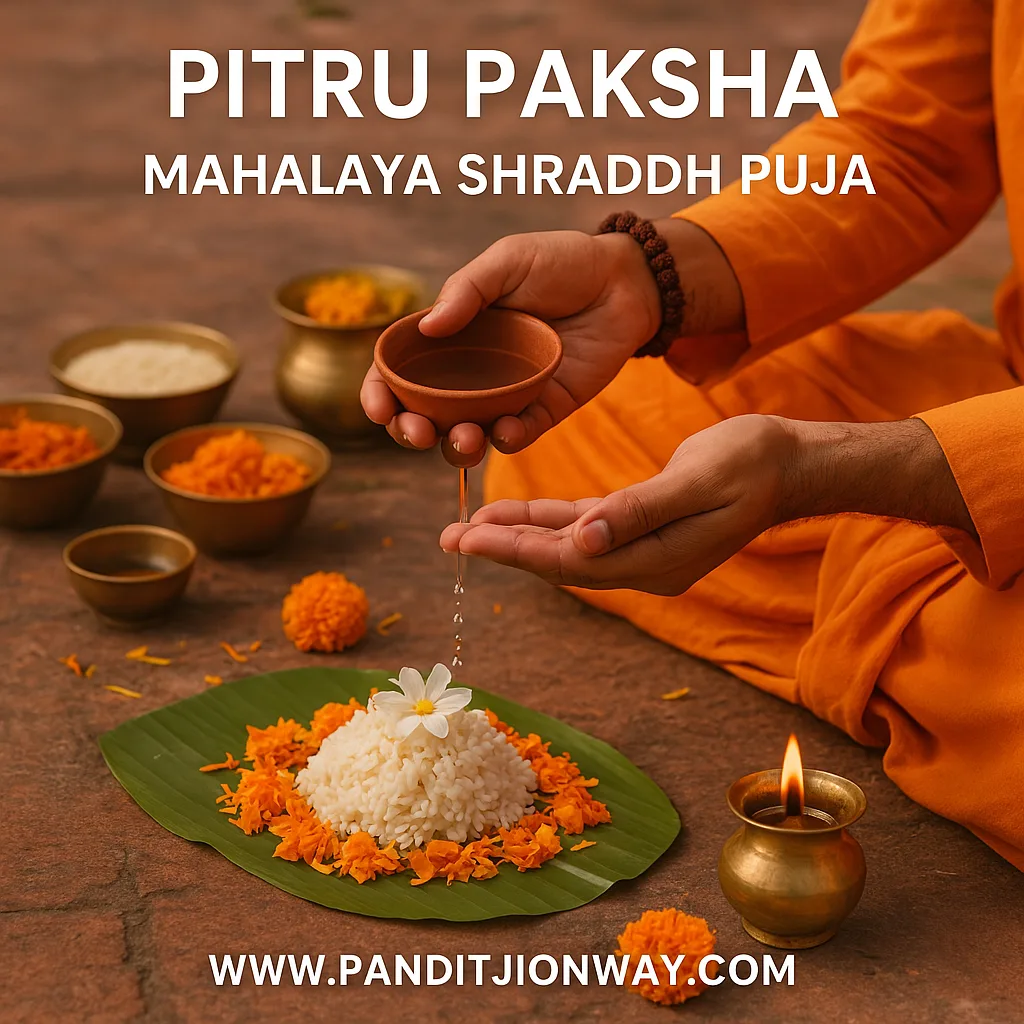
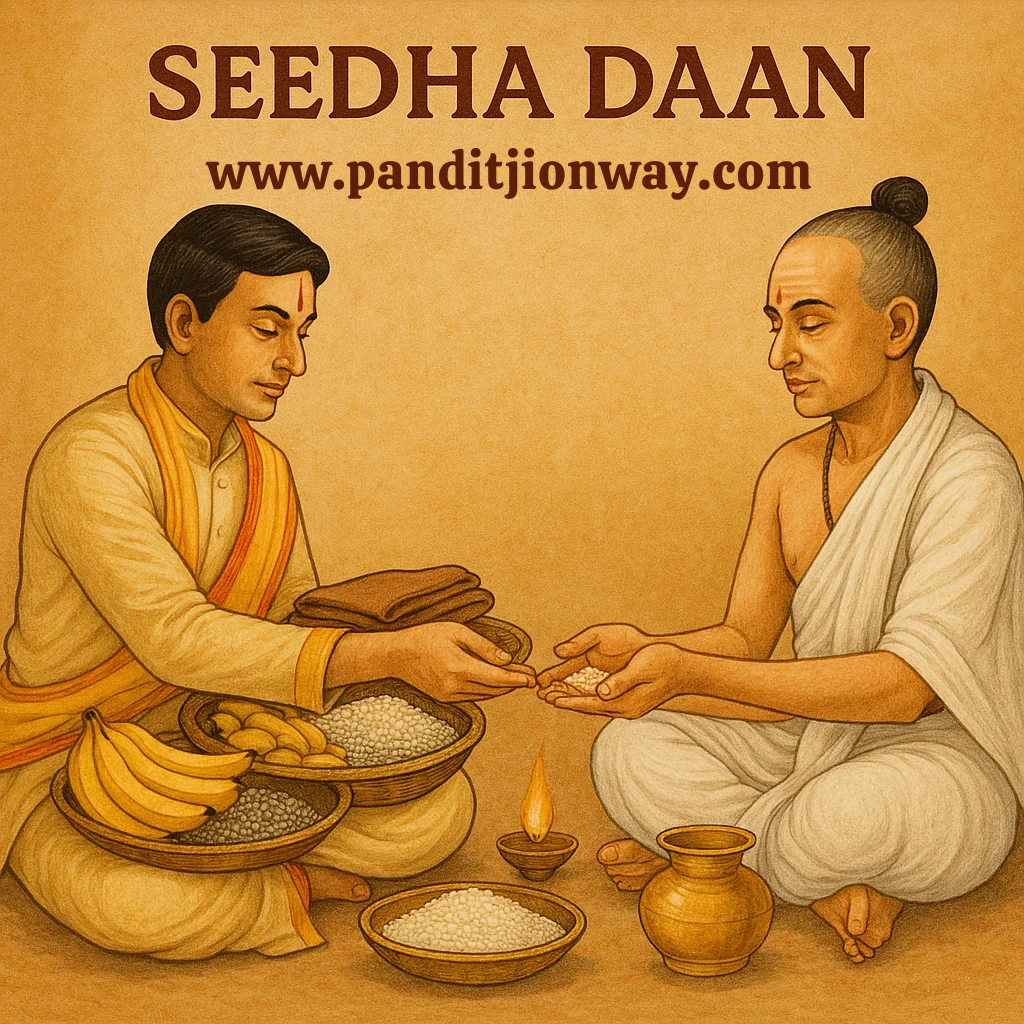
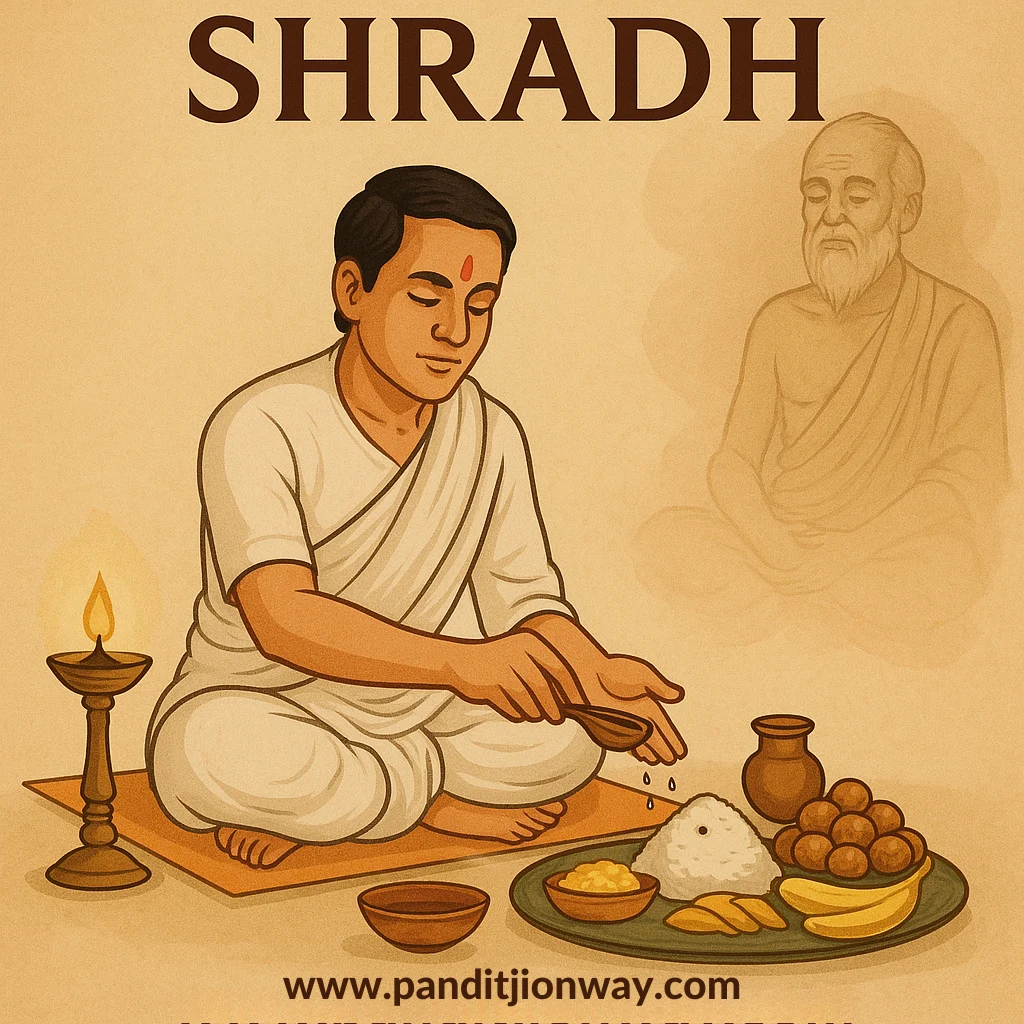
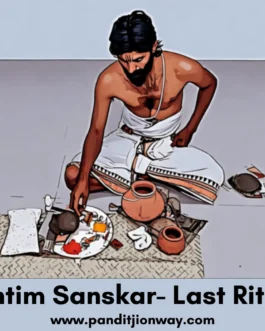


Reviews
There are no reviews yet.